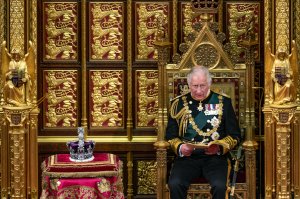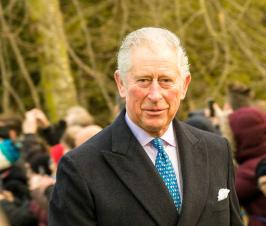The British monarch is required to take on the role of Supreme Governor of the Church of England.
No head of state should promote an official religious preference.
Let's end the ties between our head of state and the Church.
Our head of state, the monarch, holds the title 'Defender of the Faith and Supreme Governor of the Church of England'.
This means the monarch must also be a full member of the Church of England – an anachronism in one of the least religious and most religiously diverse countries in the world.
Despite dwindling congregations, the monarch must also take an oath to maintain the Church of England and to preserve the Church of Scotland.
The position of head of state should not be reserved for members of one particular faith. Most countries allow citizens of any religious affiliation to be head of state. Everyone should be free to follow any personal faith, or none. The monarch is the only person in the country not free to have whatever personal faith they wish or have none at all.
Only 34% of the public think future British monarchs should be required to be members of the Church of England and keep the title of supreme governor of the Church of England.
The ties between the Church and the monarchy are typified by the coronation. The UK is the only democracy to have such an explicitly Christian ceremony for its head of state's accession, with the monarch pledging to maintain the "Laws of God" during an Anglican coronation ceremony in Westminster Abbey. The Church has a key role in the coronation of a new monarch, who is crowned and anointed by the Archbishop of Canterbury. The coronation also has sectarian anti-Catholic overtones. Catholics are explicitly excluded from becoming monarch.
The monarch's declaration of preferential status for one denomination of one religion renders everyone who is not of that religion less than full citizens.
If British monarchs are to continue acting as head of state, they should relinquish the role of head of the Church in order to end the unfair privilege afforded to the Church of England, and show equal regard for citizens of all faiths and none.
Take Action!
1. Write to your MP
While our Head of State is also the head of the established church, we cannot have church-state separation. Ask your MP to support the separation of church and state.
2. Share your story
Tell us why you support this campaign, and how you are personally affected by the issue. You can also let us know if you would like assistance with a particular issue.
3. Join the National Secular Society
Become a member of the National Secular Society today! Together, we can separate religion and state for greater freedom and fairness.
Latest updates
NSS calls for a more secular and inclusive coronation
Posted: Thu, 3 Nov 2022 11:40
The National Secular Society has written to prime minister Rishi Sunak calling for a more secular and inclusive coronation for King Charles.
In a letter sent this week, the NSS said the "overwhelmingly Anglican" coronation traditions would be "deeply incongruent with the increasingly pluralist and secular society that is 21st century Britain".
It said the coronation is a "primarily religious ceremony", highlighting that the King will swear an oath to the Church of England, be anointed with holy oil and partake in holy communion.
It said this is an "inapt way to inaugurate a head of state" as the UK now has a nonreligious majority and a significant proportion of citizens who follow non-Christian religions.
The UK is the only country in Europe which crowns its monarch in a religious ceremony.
According to NatCen's 2019 British Social Attitudes survey, 52% of British people have no religion and just 12% of Britons are affiliated to the Church of England.
The Church of England's own 2019 report found that less than one percent of the population attends CofE services on a Sunday.
The fact that the prime minister's Hindu observance has proved no obstacle in assuming the nation's top political job only serves to highlight "the outdated and inequitable nature of our constitutional monarchy", the NSS said.
The NSS's letter comes after the UCL Constitution Unit recently suggested a separate secular event be held in Westminster Hall to mark the coronation. They also proposed a less expressly Anglican coronation oath.
NSS: Coronation should 'affirm all citizens equally'
NSS chief executive Stephen Evans said: "A religious coronation is a bizarre way to inaugurate a head of state in one of the world's least religious countries.
"The UK's religious landscape has changed out of all recognition since the last coronation. The government must therefore to find ways to ensure forthcoming coronation marks the nation's diversity and affirms all its citizens equally."
"Ultimately, the role of head of state in a modern democracy that aspires to be a beacon of equality and freedom should have no constitutional ties to religion."
Image: House of Lords 2022 / Photography by Annabel Moeller, CC BY 2.0
Coronation should be less Anglican, more secular, report suggests
Posted: Tue, 25 Oct 2022 16:52
A less Anglican, more secular coronation for King Charles could "celebrate the nation's diversity", a think tank has said.
In two reports published yesterday, the UCL Constitution Unit said the coronation should "be less overwhelmingly Anglican" and "affirm that the state embraces all of its citizens equally".
"[A] secular ceremony could celebrate the nation's diversity in ways that an Anglican service cannot", it added.
In its current form, the coronation is an overtly religious event: the monarch swears an oath to the Church of England and is anointed with oil by the archbishop of Canterbury in Westminster Abbey.
The Unit cites Wesley Carr, a former Dean of Westminster, who thought the coronation should be accompanied by a secular event at Westminster Hall. Such an event would be, he said, "a suitable way for the Crown to affirm the ethnic and religious plurality to which the social reality points within the continuity that the nation seeks".
In September, the King set out his "respect" for "those who seek to live their lives in accordance with secular ideals".
The coronation oath
The coronation oath requires the monarch to swear to "maintain and preserve inviolably the settlement of the Church of England, and the doctrine, worship, discipline, and government thereof".
The Unit suggest rewording the oath to: "Will you [use] … your power [to] maintain tolerance and freedom, including religious tolerance; and will you seek to uphold the rights of all your Peoples to observe their different religions and beliefs without fear of persecution?"
The report quotes Anglican commentator Paul Bradshaw who find the oath unpalatable: "is there not something rather distasteful about the spectacle of the Archbishop of Canterbury exacting a commitment from the monarch to secure the interests of the Church before proceeding to anoint him/her?"
Young people are particularly likely to find a religious oath "alienating", the Unit added.
The reports follow 2019 polling which found only 35% of the UK public believe the monarch should swear a religious oath. There was equally little support for the requirement that the monarch be a member of the Church of England.
NSS: 'The coronation of a new monarch should serve as a moment of national unity'
The NSS has long called for a secular head of state as broader campaign to disestablish the Church of England.
Its 2017 'Separating Church and State: The Case for Disestablishment' report concluded the accession of then-Prince Charles represented a "particularly opportune moment" to press for disestablishment.
NSS campaigns officer Alejandro Sanchez said: "The investiture of a new head of state should serve as a moment of national unity. An overtly Anglican ceremony coupled with an oath of allegiance to the Church is contrary to that goal.
"The King has said he respects those who live their lives in accordance with secular ideals. It is now time that the coronation be reformulated to reflect the secular, pluralist society that 21st century Britain is."
Image: Mark Jones from Stradishall, Newmarket, suffolk, CC BY 2.0




